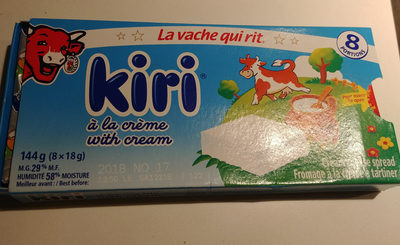
Barcode: 3073781025170
Kiri vache qui rit
HALAL
📝 Reason: All the ingredients in ‘Kiri vache qui rit’ are Halal according to Islamic dietary law since: no Haram Ecodes (E120, E124, E354, E999) are present, no doubtful animal or meat-derived/non-certified enzymes are found, and all additives (sodium citrate, sodium phosphate, carrageenan) are plant/mineral based or Halal-certified E-codes. Islamic food authorities such as IFANCA and HFA confirm these ingredients are permissible (Quran 5:3).
🏷️ Category: Dairies, Fermented Foods, Fermented Milk Products, Cheeses, Processed Cheese, Cubed Appetizer Cheese, Fr:Fromage Canada
📄 Certificates: Vegetarisch
Ingredients:
Details
Kiri vache qui rit: Understanding Its Halal Status
Kiri vache qui rit, a popular processed cheese product, raises questions regarding its compliance with Halal dietary laws. Given the increasing demand for Halal products, particularly among Muslim consumers, ensuring the Halal status of food items is paramount. In this article, we will explore the Halal status of Kiri vache qui rit, its ingredients, and their compliance with Islamic dietary laws.
Halal Status Overview
The Halal status of Kiri vache qui rit is confirmed as HALAL. All its ingredients comply with Islamic dietary laws. Significant Islamic food authorities, such as the Islamic Food and Nutrition Council of America (IFANCA) and the Halal Food Authority (HFA), recognize the product as permissible, based on Quranic verse 5:3 which addresses dietary restrictions.
Ingredient Analysis
Let’s break down the ingredients and corresponding E-numbers found in Kiri vache qui rit:
- Pasteurized Milk and Cream: This ingredient is inherently Halal as milk and cream are permissible in Islam, provided they are not mixed with haram substances. Pasteurization does not impact its Halal status. [Source](https://www.ifanca.org/faq/milk-cream-halal/)
- Water: Water is a basic and organic substance, and it is considered Halal. [Source](https://www.halalfoodauthority.com/ingredients)
- Modified Milk Ingredients: These are derivatives of milk such as whey and casein. They remain Halal unless processed with haram substances, which is not the case here. [Source](https://www.halalfoodauthority.com/dairy)
- Sodium Phosphate (E339): This mineral salt additive is Halal. It does not derive from animal sources, ensuring it meets dietary requirements. [Source](https://www.foodchemadditives.com/ingredients/sodium-phosphates-E339)
- Sodium Citrate (E331): A salt of citric acid, sodium citrate is considered Halal and plays a role in cheese’s properties. [Source](https://www.foodchemadditives.com/ingredients/sodium-citrate-E331)
- Carrageenan (E407): Extracted from seaweed, carrageenan is Halal. This additive is commonly used as a stabilizer and thickener in various food products. [Source](https://www.halalharam.org/food-additives-number-e-codes/)
- Bacterial Culture: Bacterial cultures used in cheese production are typically Halal unless cultured on haram media, which is not indicated for this product. [Source](https://www.halalfoodauthority.com/dairy)
- Microbial Enzymes: Generally, microbial enzymes derived from fermentation are Halal unless derived from haram sources, which is not the case here. [Source](https://www.ifanca.org/faq/enzymes-halal/)
Conclusion
In conclusion, Kiri vache qui rit is a versatile and Halal-compliant dairy product that can be enjoyed without concern by those adhering to Islamic dietary laws. With a clear understanding of its ingredients—none of which pose a conflict with Halal principles—consumers can confidently include it in their diets. Furthermore, this product serves as a great option for those looking to enhance their meals, whether as part of a cheese platter or in recipes.
For those seeking Halal products, Kiri vache qui rit not only fulfills dietary requirements but also ensures quality and taste, making it a staple in the dairy and cheese category.
